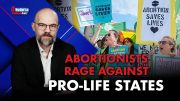
According to the Minneapolis Star Tribune, Brian Johnson, an evangelical Christian from Hayward, Wisconsin, said that he had received no major complaints about his long-tenured outreach at the event until 2009, when organizers refused to rent him a booth after questioning him about his views on homosexuality. As in past years, Johnson and his family had planned to walk through the venue offering Bibles to participants, until festival officials told them they must leave. “A police officer allegedly told Johnson that the park was ‘private property’ that day, and Johnson was arrested when they didn’t leave,” reported the Star Tribune. Charges against him were later dropped.
The city’s Pride Fest has been an annual event for the past 30 years, with crowds of over 200,000 participants crowding the park and surrounding area for concerts, food, and sundry exhibits of unique interest to homosexuals. Johnson said that the venue is ideal “to reach as many people as possible” with the message of the gospel. “Over the years, Johnson has come across many individuals in the GLBT community who have expressed disdain and distrust for organized religion, and Johnson wants those individuals to know the real Jesus,” his lawsuit stated.
In 2010, Pride Fest organizers again turned back Johnson’s efforts to set up a display at the event, even though the Minneapolis Park Board ruled that his presence and activities were protected by the First Amendment. Festival organizers sued the Park Board, and while U.S. District Judge John Tunheim sided with the city, he suggested a compromise. “In theory, Twin Cities Pride could designate ‘free-speech zones’ on the Pride Festival grounds in which anyone who wishes to distribute literature or display signage may do so,” Tunheim wrote in his opinion.
The Park Board and the “gay pride” festival organizers agreed, resulting in the Park Board prohibiting unapproved materials from the main festival site and requiring Johnson to be isolated with his Bibles to a “no pride zone” that renders his presence at festival irrelevant, said attorney Nate Kellum of the Alliance Defense Fund (ADF).
“The government should not be exiling free speech, it should be protecting it,” Kellum said of the “compromise” the ADF is challenging in the suit on behalf of Johnson. “It’s ridiculous to say that the only place where people can hand out Bibles is an area where there’s no one to hand Bibles to. The Constitution simply does not permit the board to relegate free speech to isolated regions where no one can receive the message. That’s not free speech at all. It’s pure censorship.”
Although Johnson was originally slated to be part of the lawsuit filed by Twin Cities Pride against the Park Board, the judge in the case later removed him, relying on the Park Board to adequately represent his interests. While Johnson was active in that suit, the Park Board argued that keeping people from distributing Bibles in the park would be unconstitutional, recalled Jonathan Scruggs, another ADF attorney in the case. But once Johnson was no longer part of the suit, the board struck the “compromise” deal with the homosexual group.
“Clearly, Brian’s interests were not adequately represented at all,” said Scruggs of the backroom deal. “So our client has no choice but to file his own suit to stop this obviously flagrant violation of the First Amendment.”
Dot Belstler, executive director of Twin Cities Pride, told the Star Tribune that while Johnson doesn’t “accost” attendees at the festival, he does make them feel uncomfortable in referring to the behavior they are celebrating as sin. “He’s a very open, likable gentleman,” Belstler conceded. “He would talk to people and kind of engage them in conversation and then would go into, that they’re going to hell, they’re an abomination. That’s really kind of the exact opposite of our message of pride in being OK with who you are.”
Belstler added that several Christian organizations participate in the festival, “but they are open and welcome to the GLBT community. He’s not. He doesn’t fit.”
Nonetheless, ADF argues that the city and the event organizers have overstepped their boundaries. “The Park Board has essentially put a large cast, or a large prohibition, on free speech in a public park,” said Scruggs. He added that “in this situation we’re not talking about protests. We’re not talking about loud noise. We’re talking about literature distribution. You can’t exile free speech to certain areas if that free speech doesn’t cause any problems.”
Johnson’s lawsuit contends that the compromise zone “is placed away from all of the routes and pathways entering Loring Park…. A booth outside of the Pride Fest event did not allow Johnson to reach his intended audience (those attending Pride Fest) with his message via Bibles.”
Joel Nichols, a professor at University of St. Thomas School of Law, located just blocks from the pride festival, said Johnson’s suit has merit, explaining that while the city can impose reasonable restrictions on the time, place, and manner of public speech, the restrictions cannot result in blocking the message from the speaker’s intended audience. Nichols told the Star Tribune that if Johnson’s activities aren’t disruptive, “he’s clearly allowed to be there.”
According to the paper, “Nichols said if [his booth is] tucked into a corner, then Johnson has ‘a pretty good claim’ that he’s not being treated equally. And if the Park Board has a policy allowing free speech but makes an exception for this event, Nichols said, ‘then he really is being discriminated against.’”
The ADF-filed suit argues that Johnson’s Bible distribution and dialogue with festival participants has not caused any obstructions. “He never draws a crowd, preferring to deal with individuals one on one,” the suit insists. It adds that “Johnson has always made a conscious effort to avoid any discussion about the propriety of homosexuality. He does not go there to condemn anyone. He focuses on the reality that all people sin — whether involved in homosexual behavior or not — and thus all need Jesus.”



